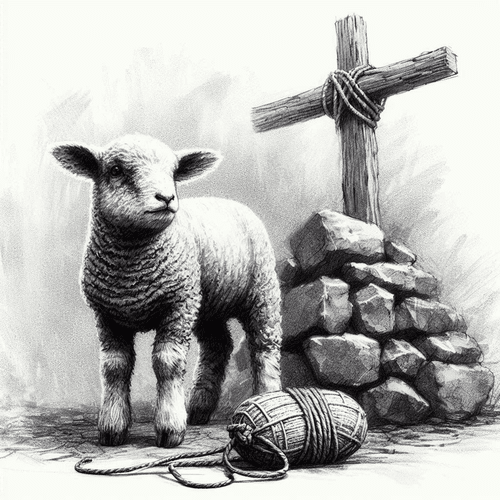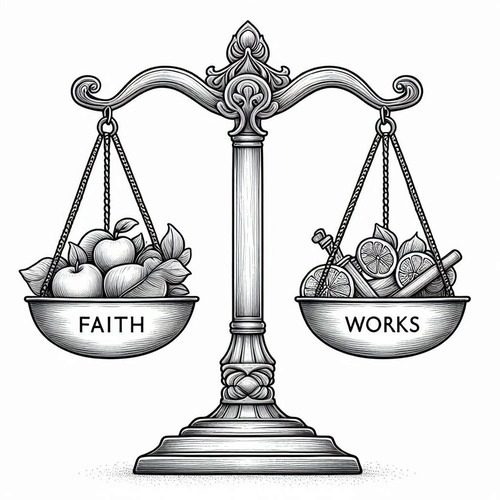The Reformation’s Five ‘Solas’: Cornerstones of Salvation
IMAGE CAPTION: When it all began: The glorious Reformation began with Martin Luther nailing his 95 Theses to a cathedral door in 1517
Reclaiming the Gospel
The Protestant Reformation’s Five ‘Solas’: The Reformation was a monumental movement that reshaped Western Christianity and sent ripples across the world. At its heart was a daring challenge to the flawed doctrines and authoritarian abuses of the Roman Catholic Church. Through their united efforts, the Reformers reclaimed the gospel’s pure, glorious doctrine of salvation by grace alone.
Led by stalwarts like Martin Luther and John Calvin, the Reformers with their rallying cry of “Sola Scriptura” (Scripture Alone) resounded the call to make the Bible the supreme authority for faith and practice in the church. No longer would human traditions and papal decrees usurp God’s inerrant, complete Word. While not explicitly formulated together during the Reformation, the Solas were later distilled from the Reformers’ collective teachings, reflecting the convictions of theologians like Huldrych Zwingli, Philip Melanchthon, John Knox, Thomas Cranmer and William Tyndale.
Crystallizing this biblical emphasis were the five Latin Solas (meaning “alone”)—rays emanating the guiding light of truth with pinpoint precision. These five Solas formed the bedrock truths recovering the apostolic gospel of salvation. Let us explore what they are and why they remain immensely vital:
Sola Scriptura (Scripture Alone)
With prophetic boldness, the Reformers rejected any authority being placed over or equated to the Bible. Scripture alone reigned as the inspired, sufficient and infallible source of God’s special revelation to humanity (2 Timothy 3:16-17). Not Scripture plus tradition or papal proclamations, but Scripture alone held the supreme, binding truth about salvation.
Sola Gratia (Grace Alone)
The Bible message rang out unequivocally—humanity is radically depraved, unable to earn favour with God through any works or merits of our own (Ephesians 2:8-9). Against the Catholic system of indulgences and obedience-based righteousness, rings out this message that fallen man can find salvation by God’s grace alone through His unmerited favour.
Sola Fide (Faith Alone)
How then do we receive this amazing grace? The Reformers upheld the biblical truth it is through faith alone in Christ’s finished work, not our feeble efforts (Romans 3:28). Real faith isn’t mere intellectual assent but a repentant, spiritual rebirth that leads to transformation (James 2:17). Yet even this faith isn’t our own doing but a gracious gift from God (Ephesians 2:8).
Solus Christus (Christ Alone)
At the blazing centre of this theological reinvigoration was the supreme truth that salvation is found in Christ alone as the singular Mediator between God and man (1 Timothy 2:5). His death alone pleases the Father and propitiates for sins. No human priests, saints or Mary can offer salvific mediation. Christ alone is the Way, Truth and Life (John 14:6).
Soli Deo Gloria (Glory to God Alone)
Ultimately, God alone deserves all glory for the wondrous drama and work of redemption. From predestination to justification to sanctification to glorification, it’s all about magnifying His infinite majesty, wisdom, grace and power in radically restoring fallen humanity (Romans 11:36). Salvation exalts and elevates God alone as the Creator, Sustainer and Redeemer.
The Reformation’s Five ‘Solas’ weren’t just catchy phrases. They were powerful truths that stripped away years of man-made rules in the church.
Today, these principles still matter. They remind us that salvation comes from God’s kindness through Jesus. Our job is to trust Him, follow the Bible, and live for God’s glory.
If you feel weighed down by religious rules or traditions, let the Reformation’s Five ‘Solas’ light your way. They show us that salvation is God’s amazing gift from start to finish!
In a world where it’s easy to lose sight of what’s important, the Reformation’s Five ‘Solas’ keep us focused on the heart of the Christian faith. They’re like five bright flames, keeping the true message of the gospel burning strong.
Editor's Pick

The Nashville Statement: Why Affirm It Despite Media Backlash?
WHY DO REFORMED CHRISTIANS STAND BY THIS STATEMENT ON MARRIAGE AND GENDER? When the Nashville Statement was released in 2017, [...]

Who Is Belial? Solving The 2 Corinthians 6:15 Mystery
Belial: This name from the pages of Scripture chills the soul. Who is this mysterious figure Paul invokes in 2 [...]

Celibacy Or Castration: What Jesus Really Means in Matthew 19:12
One of Scripture's most shocking misinterpretations led theologian Origen to castrate himself in the third century. His tragic mistake? Taking [...]

Philippians 4:13: Did Paul Really Mean We Can Do ALL Things?
"I can do all things through Christ who strengthens me." It's on gym walls, graduation cards, and motivational posters everywhere. [...]

The Ordinary Means of Grace: Why Are They Indispensable?
ORDINARY MEANS FOR EXTRAORDINARY TRANSFORMATION What if God's most powerful work in believers' lives happens through the most ordinary activities? [...]

Is the Bible God’s Word? Or Does It Only Contain God’s Word?
The authority of Scripture stands at the crossroads of modern Christianity. While some argue the Bible merely contains God’s Word [...]

Will We Remember This Life in Heaven? What Isaiah 65:17 Means
"Will I remember my spouse in heaven? My children? Will the joy we shared on earth matter in eternity?" These [...]

From Empty to Overflow: The Abundant Life Jesus Promised
(AND WHY YOU SHOULDN’T SETTLE FOR LESS) We're surviving, but are we thriving? If we're honest, there's a gap between [...]

What Does Jesus Save Us From?
THREE BIBLE TRUTHS ABOUT SALVATION "Jesus saves." We’ve seen it on bumper stickers, heard it shouted at sporting events, maybe [...]

If God Wants Everyone Saved, Why Aren’t They?
THE REFORMED VIEW ON GOD’S DESIRE VS HIS DECREE The question haunts every believer who has lost an unbelieving loved [...]
SUPPORT US:
Feel the Holy Spirit's gentle nudge to partner with us?
Donate Online:
Account Name: TRUTHS TO DIE FOR FOUNDATION
Account Number: 10243565459
Bank IFSC: IDFB0043391
Bank Name: IDFC FIRST BANK






